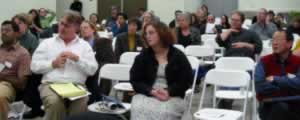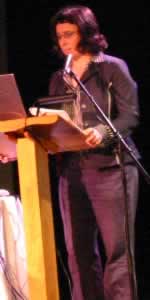On Criticism
Greco is angry because so much hypertext criticism is small-minded and inept. It's also unreadable. It doesn't have to be.
Let's look at Ebert, taking on a terrible challenge: reviewing a mediocre movie that readers expect to be mediocre. What can you say about The Scorpion King?
"Of all the special effects in the movie, the most impressive are the ones that keep the breasts of the many nubile maidens covered to within one centimeter of the PG-13 guidelines. Hu, a beautiful woman who looks as if she is trying to remember the good things her agent told her would happen if she took this role, has especially clever long, flowing hair, which cascades down over her breasts instead of up over her head, even when she is descending a waterfall.
Did I enjoy this movie? Yeah, I did, although not quite enough to recommend it...
This isn't showy, but he makes a point about craft, and another point about the limits of craft, and we have fun reading it. Compare this to Scott Rettberg in EBR:
A hypertext novel, with its simple links, might map metaphorically to a relatively simple instrument, such as a flute or a guitar, while a VRML MOO complete with programmed AI avatars might map to something more along the lines of a pipe organ. Symphonies will be written, but before they are realized both writers and readers will need to figure out how to work with the many new instruments at hand.
Rettberg is reaching higher, and his horn won't hit the note. Ebert shows humor and sympathy to an actress caught in an difficult place and awkward costume, Rettberg is busy fluting his metaphor. Whether "mapping" is an apt metaphor or not, it's hard to care as much about it as we care for Ebert's actress. Is a pipe organ a complex instrument, compared to a guitar? In terms of polyphonicity, or difficulty of performance, or subtlety of repertoire, or what? What's the obsolete VRML doing here? After all those conditional verbs, who knows?
Rettberg can do better than this; look at his fiction. But this is one of the better parts of the essay. Elsewhere, he stumbles (as writers do) and his editors at EBR don't take the trouble to save him. For extra credit, listen to this muddled nostalgia for the good old school days of his youth which (since Mr. Rettberg is still in school) must have been more recent than he wants you to think.
Back in the day when William Gillespie and I were enrolled in David Foster Wallace's M.A. fiction writing workshop at Illinois State University, which at the time was chock-full of eager young postmodernists striving to subvert the work of their forbears, our discussion often circled back to the ideas - not to familiar workshop dictums about showing vs. telling - but to the problem of "showing off," and in the process "telling off" the reader. When we youngsters utilized techniques such as nonlinear narrative, disruptive shifts of discourse style mid-story, radical deconstruction of givens of traditional storytelling such as plot, character, and setting etc., Wallace usually reacted in a surprisingly negative, surprisingly conservative way....

 One problem with the state of our art is that we don't understand our own jargon. I've been working in the field for years, I build hypertext tools professionally, and I have no idea what "cross-fertilization" means here. We've got a jumble of popular products (Night Kitchen, Storyspace), research prototypes (RED, from PARC), and artists who make software (Bill Seaman, UCLA) on stage, but we don't know what we're really expected to be talking about. Neither does the audience. This leaves everyone feeling uneasy, edgy, unhappy.
One problem with the state of our art is that we don't understand our own jargon. I've been working in the field for years, I build hypertext tools professionally, and I have no idea what "cross-fertilization" means here. We've got a jumble of popular products (Night Kitchen, Storyspace), research prototypes (RED, from PARC), and artists who make software (Bill Seaman, UCLA) on stage, but we don't know what we're really expected to be talking about. Neither does the audience. This leaves everyone feeling uneasy, edgy, unhappy.  The best part of the ELO conference, much like the best of last year's Digital Arts and Culture, was the chance to see hypertext writers and electronic poets perform their work.
The best part of the ELO conference, much like the best of last year's Digital Arts and Culture, was the chance to see hypertext writers and electronic poets perform their work. 
 a daily web comic, created by illustrator Chris Baldwin. (Baldwin also did the characters for my "Where Are The Hypertexts?", as well as the Storyspace development cat). Recently, Baldwin has added a simple web journal to the Bruno page as a sort of pendant, a personal note from the artist.
a daily web comic, created by illustrator Chris Baldwin. (Baldwin also did the characters for my "Where Are The Hypertexts?", as well as the Storyspace development cat). Recently, Baldwin has added a simple web journal to the Bruno page as a sort of pendant, a personal note from the artist.